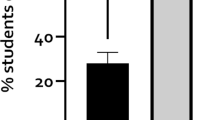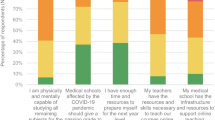Abstract
Comprehensive education regarding human papillomavirus (HPV) pathogenesis, vaccination, and patient counseling are not routinely included in the medical school curriculum; consequently, student and provider knowledge, especially concerning head and neck pathology, remains low. The objective of this study was to demonstrate long-term retention of HPV knowledge and positive attitudes towards HPV vaccination after attending our novel HPV workshop, with a focus on knowledge of oropharyngeal cancer. A follow-up survey was administered to medical students 1.5 years after the initial completion of the workshop. HPV vaccination records from the student-led clinic were collected from the immunization information system. Awareness that HPV causes oropharyngeal cancer was present in 33% of medical students pre-curriculum; immediate and long-term post-curricular awareness of this association remained at 90% or higher (p < 0.0001). Comfort with HPV counseling, having enough information to recommend the vaccine, and knowledge of HPV malignancies, symptoms, transmission, and vaccination schedule remained persistently elevated over pre-curriculum scores (p < 0.05). Long-term knowledge scores were also higher than a control group of medical students at the same stage of training who had never participated in the workshop (p < 0.05). HPV vaccination rates at the medical school’s student-run clinic also increased after the curriculum, from an average of 1.89 HPV vaccines given per clinic to 3.55 (p = 0.001). This study demonstrates that knowledge and positive attitudes were maintained 1.5 years after participating in this HPV curriculum during students’ preclinical years of medical school. Additionally, an increase in HPV vaccination rates occurred at a student-led clinic, indicating a positive clinical impact on the curriculum.


Similar content being viewed by others
Data Availability
The data that support the findings of this study are available on request from the corresponding author, SS.
Code Availability
Not applicable.
References
Evans L, Matley E, Oberbillig M, Margetts E, Darrow L (2020) HPV Knowledge and attitudes among medical and professional students at a Nevada University: a focus on oropharyngeal cancer and mandating the vaccine. J Cancer Educ 35(4):774–781. https://doi.org/10.1007/s13187-019-01529-y
Leung SOA, Akinwunmi B, Elias KM, Feldman S (2019) Educating healthcare providers to increase human papillomavirus (HPV) vaccination rates: a qualitative systematic review. Vaccine X 3:100037. https://doi.org/10.1016/j.jvacx.2019.100037
Anderson S, Isaac A, Jeffery CC et al (2017) Practices regarding human papillomavirus counseling and vaccination in head and neck cancer: a Canadian physician questionnaire. J Otolaryngol - Head Neck Surg J Oto-Rhino-Laryngol Chir Cervico-Faciale 46(1):61. https://doi.org/10.1186/s40463-017-0237-8
Elam-Evans LD (2020) National, regional, state, and selected local area vaccination coverage among adolescents aged 13–17 years — United States, 2019. MMWR Morb Mortal Wkly Rep 69:1109–1116. https://doi.org/10.15585/mmwr.mm6933a1
FDA approves HPV vaccine for head and neck cancer prevention. Moffitt Cancer Center. https://moffitt.org/endeavor/archive/fda-approves-hpv-vaccine-for-head-and-neck-cancer-prevention/. Accessed 17 Aug 2021
Batur P (2020) The HPV vaccine: Understanding and addressing barriers to vaccination. Cleve Clin J Med 87(9):545–548. https://doi.org/10.3949/ccjm.87a.20082
Thompson EL, Rosen BL, Vamos CA, Kadono M, Daley EM (2017) Human papillomavirus vaccination: what are the reasons for nonvaccination among U.S. adolescents? J Adolesc Health 61(3):288–293. https://doi.org/10.1016/j.jadohealth.2017.05.015
Gooi Z, Chan JYK, Fakhry C (2016) The epidemiology of the human papillomavirus related to oropharyngeal head and neck cancer. Laryngoscope 126(4):894–900. https://doi.org/10.1002/lary.25767
Van Dyne EA, Henley SJ, Saraiya M, Thomas CC, Markowitz LE, Benard VB (2018) Trends in Human Papillomavirus–Associated Cancers — United States, 1999–2015. MMWR Morb Mortal Wkly Rep 67:918–924. https://doi.org/10.15585/mmwr.mm6733a2
Loizou C, Laurell G, Lindquist D, Olofsson K (2014) Voice and quality of life in patients with recurrent respiratory papillomatosis in a northern Sweden cohort. Acta Otolaryngol (Stockh) 134(4):401–406. https://doi.org/10.3109/00016489.2013.867457
Jeynes C, Chung MC, Challenor R (2009) ’Shame on you’–the psychosocial impact of genital warts. Int J STD AIDS 20(8):557–560. https://doi.org/10.1258/ijsa.2008.008412
Commissioner O of the. Coronavirus (COVID-19) Update: FDA issues new policy to help expedite availability of diagnostics. FDA. Published March 27, 2020. https://www.fda.gov/news-events/press-announcements/coronavirus-covid-19-update-fda-issues-new-policy-help-expedite-availability-diagnostics. Accessed 20 Apr 2020
Wiley R, Shelal Z, Bernard C, Urbauer D, Toy E, Ramondetta L (2019) Team-based learning module for undergraduate medical education: a module focused on the human papilloma virus to increase willingness to vaccinate. J Cancer Educ Off J Am Assoc Cancer Educ 34(2):357–362. https://doi.org/10.1007/s13187-017-1311-7
Schnaith AM, Evans EM, Vogt C et al (2018) An innovative medical school curriculum to address human papillomavirus vaccine hesitancy. Vaccine 36(26):3830–3835. https://doi.org/10.1016/j.vaccine.2018.05.014
Xue H, Yuan H, Li G, Liu J, Zhang X (2021) Comparison of team-based learning vs. lecture-based teaching with small group discussion in a master’s degree in nursing education course. Nurse Educ Today. 105:105043. https://doi.org/10.1016/j.nedt.2021.105043
Burgess A, Bleasel J, Hickson J, Guler C, Kalman E, Haq I (2020) Team-based learning replaces problem-based learning at a large medical school. BMC Med Educ 20(1):492. https://doi.org/10.1186/s12909-020-02362-4
Su E, Schmidt TA, Mann NC, Zechnich AD (2000) A randomized controlled trial to assess decay in acquired knowledge among paramedics completing a pediatric resuscitation course. Acad Emerg Med Off J Soc Acad Emerg Med 7(7):779–786. https://doi.org/10.1111/j.1553-2712.2000.tb02270.x
Naeem N (2016) Which knowledge and skills do participants retain after attending medical education training workshops? Creat Educ 7(6):870–877. https://doi.org/10.4236/ce.2016.76091
Grant EC, Marczinski CA, Menon K (2007) Using pediatric advanced life support in pediatric residency training: does the curriculum need resuscitation? Pediatr Crit Care Med J Soc Crit Care Med World Fed Pediatr Intensive Crit Care Soc 8(5):433–439. https://doi.org/10.1097/01.PCC.0000282044.78432.0B
Cannick GF, Horowitz AM, Drury TF, Reed SG, Day TA (2005) Assessing oral cancer knowledge among dental students in South Carolina. J Am Dent Assoc 1939 136(3):373–378. https://doi.org/10.14219/jada.archive.2005.0180
Wen Y, Pan X-F, Zhao Z-M et al (2014) Knowledge of human papillomavirus (HPV) infection, cervical cancer, and HPV vaccine and its correlates among medical students in Southwest China: a multi-center cross-sectional survey. Asian Pac J Cancer Prev APJCP 15(14):5773–5779. https://doi.org/10.7314/apjcp.2014.15.14.5773
Afonso NM, Kavanagh MJ, Swanberg SM, Schulte JM, Wunderlich T, Lucia VC (2017) Will they lead by example? Assessment of vaccination rates and attitudes to human papilloma virus in millennial medical students. BMC Public Health 17(1):35. https://doi.org/10.1186/s12889-016-3969-x
Poelman MR, Brand HS, Forouzanfar T, Daley EM, Jager DHJ (2018) Prevention of HPV-related oral cancer by dentists: assessing the opinion of Dutch dental students. J Cancer Educ Off J Am Assoc Cancer Educ 33(6):1347–1354. https://doi.org/10.1007/s13187-017-1257-9
Ahopelto I, Mikkilä-Erdmann M, Olkinuora E, Kääpä P (2011) A follow-up study of medical students’ biomedical understanding and clinical reasoning concerning the cardiovascular system. Adv Health Sci Educ Theory Pract 16(5):655–668. https://doi.org/10.1007/s10459-011-9286-3
Acknowledgements
The authors would like to acknowledge funding and assistance from the Office of Medical Research at the University of Nevada, Reno School of Medicine, namely Danielle Eaton. Medical students, physicians, and faculty members who assisted in implementation of this workshop include Brady Janes, Eliza Matley, Megan Oberbillig, Jennifer Bennett, and Lindsay Darrow. The authors would also like to acknowledge Keanu McMurray, one of the immunization managers at the student-run clinic.
Funding
Funding was obtained from the Office of Medical Research at the University of Nevada, Reno School of Medicine.
Author information
Authors and Affiliations
Contributions
All authors contributed to the study conception and design. Material preparation, data collection, and analysis were performed by Sarah Sutton, Lauran Evans and Shaghauyegh Azar, and Catherine Mccarthy. The first draft of the manuscript was written by Sarah Sutton, Lauran Evans, Shaghauyegh Azar, and Ariel Murtagh. All authors commented on previous versions of the manuscript. All authors read and approved the final manuscript.
Corresponding author
Ethics declarations
Ethics Approval
All procedures performed in studies involving human participants were in accordance with the ethical standards of the institutional and/or national research committee and with the 1964 Helsinki Declaration and its later amendments or comparable ethical standards. The study was approved by the Bioethics Committee of the University of Nevada, Reno.
Consent to Participate
Informed consent was obtained from all individual participants included in the study.
Competing Interests
The authors declare no competing interests.
Additional information
Publisher's Note
Springer Nature remains neutral with regard to jurisdictional claims in published maps and institutional affiliations.
Rights and permissions
About this article
Cite this article
Sutton, S., Azar, S.S., Evans, L.K. et al. HPV Knowledge Retention and Concurrent Increase in Vaccination Rates 1.5 Years After a Novel HPV Workshop in Medical School. J Canc Educ 38, 240–247 (2023). https://doi.org/10.1007/s13187-021-02106-y
Accepted:
Published:
Issue Date:
DOI: https://doi.org/10.1007/s13187-021-02106-y




